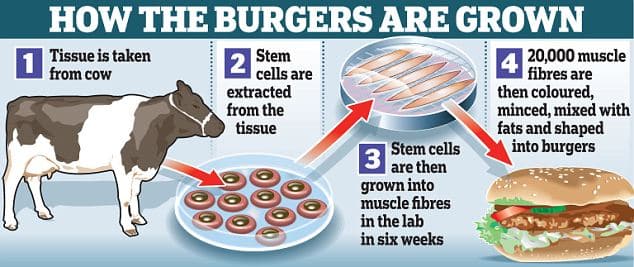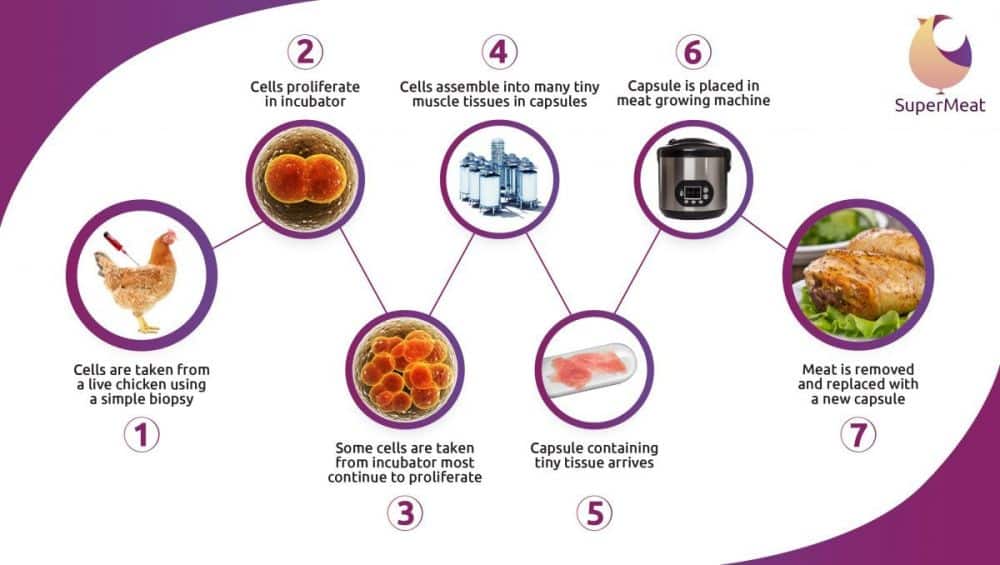Meet 7 Startups Creating Lab-Grown Meat
Table of contents

We cover a ton of disruptive technologies here at Nanalyze so that our readers understand what’s out there that may be worth investing in as opportunities present themselves. The hope is that we learn something cool and make a few bucks in the process. It also doesn’t hurt that much of the emerging tech may just help save the planet or at least help prevent us from screwing it up any further. One oft-quoted stat in that regard is that by mid-century we’ll have about 10 billion people crawling all over this blue-and-green marble in the cosmos. That’s a lot of mouths to feed, with China alone projected to have a middle class larger than any nation outside of India and the People’s Republic. And they’ll want to eat meat, and consume other resources, with all of that new-found wealth. In the past, we’ve introduced you to water technology startups that will help slack the thirst for H20. Agricultural technology, or agtech, has also been a popular topic on feeding the future, with articles here, here and here. Today we’re going to chew over the idea of subsisting on lab-grown meat.

You might already be familiar with the subject of growing meat from animal cells, something we highlighted briefly with the startup Memphis Meats in our burger of the future article earlier this year. We had also wondered at the possibility of producing leather from animal cells by a biotechnology startup called Modern Meadow. In fact, there are at least seven companies trying to commercialize lab-grown beef, chicken and seafood cultured from animal cells. The keyword here is “trying,” as the current prices are still out of range even for the regular three-star Michelin diner. For example, it costs Memphis Meats about $6,000 per pound for its test tube chicken. That represents progress: Back in 2013, Mosa Meats in the Netherlands debuted a rather dried-out beef patty at $330,000.
These startups, most taking their cues from the regenerative biotech medical industry, claim their products will represent a better alternative to industrial livestock, which accounts for about 14.5 percent of greenhouse gas emissions. Lab-grown meat, often referred to as clean meat, may also be healthier, without antibiotics and diseases that currently plague our conventional food system. And then there’s the ethical angle: Lab-grown meat means we’ll be sending fewer animals to the slaughterhouse. Bacon lovers, in particular, take note that swine are at least as smart as man’s best friend.
Companies like Cargill are certainly taking notes—and investing money. Cargill joined billionaire all-stars like Richard Branson and Bill Gates in a recent $17 million Series A to Memphis Meats. Lab-grown meat got an even bigger vote of confidence recently when China announced it would sign a $300 million deal to purchase lab-grown meat from three Israeli biotech companies. Let’s get a taste of what these startups in lab-grown meat are doing today.
100 Percent Lab-Grown Meat … Sort of


This year it also made a technical breakthrough in how it “nurtures” the meat. Currently, most lab-grown meat relies on fetal bovine serum, an expensive but nutrient-rich extract from the blood of unborn calves. The San Francisco Chronicle reports that Memphis Meats has developed a kill-free feed and that the company hopes to have a competitively priced product on store shelves in five years.
Update 01/22/2020: Memphis Meats has raised $161 million in Series B funding to open a factory where it can start producing prototypes to showcase its products to interested customers. This brings the company’s total funding to $181.1 million to date.
One of the pioneers of lab-grown meat, MosaMeat in the Netherlands made history in 2013 with its six-figure beef patty. Since then, the company has reportedly brought the price down to $11 per burger. The stem cells come from organic cows, with cells from a single cow capable of producing 175 million quarter-pounders. You would need about 440,000 bovines to produce a similar amount of beef for your next backyard barbecue. The company expects it will take at least 10 years before lab-grown meat is commercially viable.
Update 09/28/2020: Mosa Meat has raised $55 million in Series B funding to extend its current pilot production facility, expand its team, and develop an industrial-sized production line. This brings the company’s total funding to $75.7 million to date.
We Don’t Do Meat, Ok?
Update 01/17/2019: Modern Meadow was included in this article but asked to be removed as they have not been researching or developing anything in the food space for almost five years.
But is it Kosher?


Two other Israeli startups often mentioned are Future Meat Technologies, led by Hebrew University of Jerusalem professor Yaakov Nahmias who licensed his technology to SuperMeat, and Meat the Future, also led by an academic, Shulamit Levenberg, a professor of biomedical engineering at Technion, Israel Institute of Technology.
FoodNavigator reports that Future Meat Technologies is near to closing on a $2 million funding round to develop a “distributive manufacturing” model in which small businesses, and even consumers, could produce their own lab-grown meat in bioreactors using capsules containing starter tissue supplied by Nahmias’ company. Meat the Future, meanwhile, is also in early stages of development, being nurtured by one of Israel’s emerging food tech hubs, The Kitchen, to help it commercialize a tissue-engineering technology to create steak from bovine cells in a bioreactor.
Update 10/02/2018: A new meat startup, Meatable, just took in a meaningful funding round so we’re adding it to this list as an update. See below.
Founded in 2018, Dutch startup Meatable has taken in $3.5 million in funding to develop “100% real, delicious, guilt-free meat.” (Some of us already have a name for that. It’s called “meat” and you buy it in the grocery store.) The sparse website which can be found on the day of their funding announcement doesn’t provide much color aside from a hint that says “one cell can change everything.” They also provide some information about their founding team. Astute readers will notice that this is the second lab-grown meat startup we’ve looked at that’s based out of the Netherlands.
Update 03/23/2021: Meatable has raised $47 million in Series A funding, trying to shift from research and development into a food production company. This brings the company’s total funding to $62.9 million to date.
Fishing for Seafood

Conclusion
This might be the year that lab-grown meat gets the media attention and money it needs to cook up a brave new world of test-tube tuna and petri-dish poultry. Obviously, scalability and sustainability will be keys to ensure its long-term success. There’s also the competition from plant-based meat alternatives that startups like Impossible Foods and New Wave Foods are brewing up with genetically modified yeasts and other organisms, a topic we may return to in a future article.
Sign up to our newsletter to get more of our great research delivered straight to your inbox!
Nanalyze Weekly includes useful insights written by our team of underpaid MBAs, research on new disruptive technology stocks flying under the radar, and summaries of our recent research. Always 100% free.















Thanks for the article. A cruelty-free food industry would make life better not just for other animals but humans too. Why is missing from this article is information on how individuals can invest in these start-ups?
I was wondering if anyone knew of cultured meat being used to create either protein powders or bone broths that are commercially available now or close to being on the market.
I find the above very exciting. Does anyone have any information on how to invest in any of these Clean Meat companies or startups? Im having no luck.
Also with this tech it springs to mind we can start eating almost any/all meets without them being “wrong” or “taboo”. I could literally eat my own dog.
HOW DOES NANALYZE GROW REVENUE
We have a premium subscription offering – Nanalyze Premium – with hundreds of happy customers.
https://nanalyze.com/become-a-nanalyze-premium-subscriber/
We use our revenues to produce even more tools and content. Just last week, we released the Nanalyze Disruptive Tech Stock Catalog.
But that’s not all. If you act now, we’ll throw in a free set of Ginsu knives. Offer good while supplies last. Limited to stock on hand. Void where prohibited. May contain traces of peanuts and THC.
these meatless ventures are all still private.if and when the do go public how can onr be notified? a
Subscribe to Nanalyze Weekly: https://nanalyze.com/nanalyze-weekly/